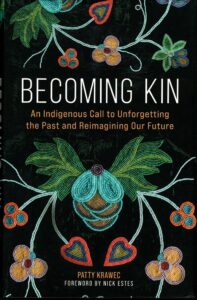Book review: Becoming Kin: An Indigenous Call to Unforgetting the Past and Reimagining Our Future
Patty Krawec’s Becoming Kin: An Indigenous Call to Unforgetting the Past and Reimagining Our Future is a well-written and argued discussion aimed at non-Indigenous peoples largely resident in the United States. It admirably traces the connections between Settler-colonialism in the Americas to Christianity while arguing that people need to unlearn deeply held myths to enable healing and reconciliation with each other and the planet. The idea of ‘relationship’ or ‘all my relations’, Nii’kinaaganaa in Anishinaabemowin, forms the core premise of the book which is tied to the idea of listening, watching, and looking for absences and presences within historical or founding myths. For instance, she references the notion that Irish immigrants were reminded of home by the Appalachians, but the Settlers never thought about the peoples displaced from their homes in the region – the Cherokee, Chickasaw, and others.
Krawec’s book is divided into eight chapters and an introduction, but it is really split into two sections. The first section, Chapters 1 through 5, explores and attempts to (re)narrate while illustrating connections or relationships between contemporary Settler society, its narratives, and effects on Indigenous peoples. The second section, Chapters 6 through 8, returns directly to Krawec’s argument that relationships and unlearning will enable the inhabitants of Turtle Island to move forward together. Specifically, she tells Settler readers that “you can enter into a relationship with us rather than as us” to become “good relatives” (158).
Overall, Becoming Kin is a wonderful work. I adopted the book as a course text since it complemented and supported the lessons I wanted the students to take from my class. It is an incredibly useful text and future resource for students as it offers suggestions and guides about actions or paths that can be taken by Settlers to begin developing relationships and relearning their collective histories and myths. The only failing the work and many like it have, which irks me, is the endless focus on the experiences of Indigenous peoples in the United States. I know from the book that Krawec is Anishinaabeg, has ties to Lac Seul, and calls Canada home which led to an assumption that greater attention, thought, and inclusion of Settler-colonialism within Canada would be the work’s core. Her overt familiarity and reliance on U.S. colonialism does not help explore or unlearn myths of assumed Canadian-colonial superiority compared to U.S.-colonialism. I was also disappointed that while the book utilizes Anishinaabe concepts such as relationship, Mino-Bimaadiziwin, and Aanikoobijigan, direct stories or histories of our experiences in either Canada or the U.S. are lacking. These disappointments, however, are mitigated by multiple factors, beginning with the narrative and compelling writing. I was delighted that Krawec included how Judeo-Christian concepts were modified or manipulated and combined with European-Mediterranean experiences through the centuries to create aggrandizing narratives and myths. These narratives and myths were accepted, consumed, and regurgitated to justify colonialism and all its forms of violence.
I am cautious about recommending this work as a must-read. I believe that non-Indigenous peoples need to read this work by Krawec. I believe that Indigenous readers will find it engaging, educational, and informative. If you are looking, like I was, for a book about becoming kin through the unforgetting of the past to reimaging our future set strongly within the Anishinaabeg Aki, it will be disappointing. Regardless, if you are interested in learning about or finding pathways to relationship though Anishinaabeg concepts set within a broad U.S.-based narrative, it is a good work.
Patty Krawec, Becoming Kin: An Indigenous Call to Unforgetting the Past and Reimagining Our Future. Minneapolis, MN: Broadleaf Books, 2022.
ISBN: 1506478255


